Here are some of the top queries from various search engines that resulted in hits on my blog during the past year or so, reproduced verbatim from my server logs. (Last year’s results are here.) Each related family of queries is listed with a main variant in bold and selected other variants, plus the percentage of query-hits represented by that family.
I was at first surprised to see that hits for “James Bond villains” outnumbers hits for “vampire lesbian girl scouts” (etc.) and “sex” (etc.) combined, but then realized: the percentages are a function both of the popularity of that search and of the ranking of my site in the search results. In other words, if you’re looking for anything about vampires or lesbians or sex I regret to say there are a lot of likelier websites for you to visit before mine.
| James Bond villains; The Villains of bond; deformed bond villains; “james bond” +villains +clothes | 10.2% |
| William H. Macy; william h macy photos; face de William H. Macy | 5.0% |
| Vampire lesbian girl scouts; lesbian vampires; naked lesbians; lesbian girl scouts; naked girl scouts; kissing lesbian girls; zombie girl scouts; evil girlscouts; girl scout decorated cake | 4.5% |
| Sex etc.; horsey style sex; lesbian masturbation; “sex positions illustrated”; vampire sex; lesbians having hot lesbian sex; lesbian sex soundeffect; “San Francisco Masturbate-a-thon”; squat girl masturbate -cock -man -boy -blow; dildo attached to wall; sex positions kitty style; attach dildo to floor; How to convince my lady staf for sex?; sex positions in alphanumeric; “park and ride” “sex positions illustrated” | 3.2% |
| Jaws ride; Jaws ride construction; jaws hitchcock | 3.1% |
| e to the i pi plus one; pi relation to e; mathematical constant e Euler comic; relating pi, e, 1 and 0; “amazing relationship” e pi | 2.3% |
| Don Fanucci; vito corleone fanucci | 2.3% |
| Honeybee/Bees in chimney; humming sound when close glass fireplace doors; honeybees in chimney; bees in fireplace; bees chimney flying down | 2.2% |
| Star Wars; 5th august 1977; star wars remake; hoth rebel base; “your tauntaun will freeze”; exegesis “empire strikes back”; star wars ben kenobi ghost; was obi wan strong enough to defeat palpatine; In Episode 5 what is the insult of Leia to Han Solo which Chewie laughed that Han called him “fuzzball” ?; lego star wars millennium falcon; star wars cassette tape 1977; “bob glickstein” “star wars”; mark hamill car crash empire strikes back monster; han solo slices open tauntaun quote; HOW DID THE FREAKIN EMPIRE BEGIN?!!!!!!!!!!!!!!!!!!!!!!!!!!; August+5th+1977; star wars novelization 1977; What does yoda say when luke comments that he is not afraid; why didn’t Luke kill the Wampa; “asteroid field”+”star wars”; star wars allegories; star wars 1970 nerd; “time magazine” 1977 “star wars” | 2.1% |
| Pirates of the Caribbean; pirate medallion; does elizabeth swann love jack sparrow; elizabeth swann’s red dress; jack sparrow character motivation | 2.1% |
| Widescreen viewing area; “what size tv to buy”; “square inches” diagonal widescreen chart; determine tv width given diagonal; 42″ 16:9 square inches; 16:9 4:3 screen equivalence OR correspondance; DIAGONAL ASPECT RATIO FORMULA; pythagoras 16:9 screen size 32″ | 1.8% |
| Godfather; Godfather part II poster; Godfather Part 4: Fredo’s Revenge | 1.8% |
| Susan Oliver/Orion Slave Girl; vina star trek; star trek green orion slave; nude Orion slave girl; orion slave girls makeup; orion slave girls color correction | 1.7% |
| Cathy Lee Crosby/Wonder Woman; cathy lee crosby wonderwoman film download; cathy+lee+crosby+as+wonder+woman; wonder woman drag; WONDERWOMAN TV MOVIE | 1.7% |
| Rogaine; scalp conditions; itchy scalp; rogaine results; scalp exercise; rogaine effectiveness | 1.7% |
| Ursula sex; ursula undress; ursula dildo; ursula sex disney | 1.6% |
| Comcast; comcast removes channels; comcast turn off service; comcast losing west coast feeds; complaints over comcast hbo; disable speed reduction comcast cable; compression artifacts comcast; how do i delete channels i do not watch in comcast; comcast crappy broadcast; comcast reduction in service; do i get a rate reduction when comcast removes channels; I want both west coast and east coast feeds | 1.6% |
| Bob Glickstein; gee bobg; “bob glickstein” +yoga; bob glickstein andrea; bob glickstein imdb; growing up Glickstein | 1.4% |
| Trophy; ugly trophy; dna trophy; bezos trophy | 1.3% |
| Dog; how to draw dogs; “remington dog park”; dog pee drives away evil spirits; veterinary dogs and chocolate | 1.3% |
| Lulav; lulav and etrog; big picture of a lulav and etrog; lulav by its self; lulav etrog chabad; sukkot lulav without etrog | 1.3% |
| Star Trek/Enterprise/Kirk/etc.; spock uhura; Uhura uniform; 60 star trek uniform; bonk bonk on the head star trek; Captain Kirk’s Insignia; enterprise blueprints; happy birthday star trek; Klingons-Star Trek; Atheist Star Trek; | 1.2% |
| Amy Linker; what happened to amy linker; amy linker and tv land awards | 1.1% |
| Jodie Foster; jodie foster bugsy malone; YOUNG JODIE FOSTER; +”give a little love and it all comes back to you” +foster | 1.1% |
| Joseph Costanzo; joe costanzo restaurant; Joseph costanzo primadonna | 1.1% |
| The end of Superman; superman reverse time; superman in the end; superman earth spinning; can superman go the speed of light; how many times can superman fly around earth in 1 second; +”it is forbidden for you to interfere in human history”; superman rewind time; how many times does superman fly around the earth in order to reverse its rotation | 1.0% |
| Frank Pentangeli; frank pentangeli hit; roth corleone Frank Pentangeli assassination; frank pentangeli johnny ola | 1.0% |
| Thai gem scam; thailand scam; majestic export jewelry thailand scam; gems profit thailand; thai sapphire scam; thailand conman; buying gemstones, thailand, blog; thai Export Center scam; selling thai gems; what to do if conned in thailand; david maurer thailand | 1.0% |
| Evil cats | 0.8% |
| Food photography; food stylist; food styling “pasta”; food stylists cereal; food stylist burger; tricks of a food stylist | 0.8% |
| Each daughter has the same number…; In a certain family each daughter has the same number of brothers and sisters. Each son has twice as many sisters as brothers. How many sons and daughters are there in the family? Now there are two ways to do this obviously, you can do it the hard way or the easy way. | 0.8% |
| Fizzies; what ever happened to fizzies drink tablets; how do fizzies work; fizzies that are new; Fizzie tablet sex aid; truckload of fizzies; FIZZIES FOUNTAIN | 0.7% |
| James Bond; vintage james bond girls; james bond toys; the bond men; Live and Let Die Band James Bond | 0.7% |
| Pez museum; pez incredibles violet; batman pez dispensers; pez guns; why didnt violet parr become a pez machine; headless PEZ dispensers | 0.7% |
| Vincent Price; old photos of Vincent Price; Vincent Price gay; “the saint” vincent price; | 0.5% |
| Candy; old time candy; “dylan’s candy bar”; Candy of yesteryear | 0.5% |
| Entenmann’s; golden cake; entenmanns’ chocolate chip filled crumb cake recipe; entenmann fudge golden cake | 0.5% |
| Adam Stoller; why i owe adam stoller an apology; fish adam stoller | 0.5% |
| MoveOn; moveon.org bad; moveon.org founder; move away from moveon.org; moveon endorsements nov 2007 election | 0.5% |
| Vertical speed indicator/Altimeter; static port; instrument dial Concorde speed; how does an altimeter work; pitot static instruments; ram air pressure pitot; how does the vsi work? flying | 0.5% |
| Cigarettes/Camels/Still Life With Woodpecker; Joe Camel; tom robbins woodpecker; camel tom robbins | 0.5% |
| Baron Munchausen; was baron munchausen an atheist | 0.5% |
| Sharon Stone; sharon stone naked; sharon stone’ pictures, 1970; sharon stone en lingerie fine | 0.5% |
| Computer; computers internet blog; “apple II home computer” | 0.4% |
| xkcd; xkcd complex numbers; calculus xkcd; math xkcd | 0.4% |
| Bob Falfa/Martin Stett; big bob falfa; purchase a bob falfa hat; falfa and milner | 0.4% |
| Adrift/Open Water 2; “open water 2” true story tried everything; understand explain open water 2:adrift ending?; FORGOT TO LOWER LADDER ON YACHT | 0.4% |
| Honda Fit; finding a honda fit; pre order “honda fit” bay area; vw rabbit or honda fit? | 0.4% |
| Carl Sagan; “carl sagan” +billions; cosmos carl sagan vangelis heaven hell; “circumference of the earth” carl sagan; eratosthenes carl sagan; Carl Sagan and Star Trek | 0.4% |
| Splashdown; splashdown lyrics meaning; i feel so elated would you please bring me joy lyrics; free splashdown downloads karma slave; lyrics so if your past approaches you pulled into a war you’ll lose; karma slave splashdown video; i feel so elated i do i do splashdown | 0.4% |
| The Incredibles; Life Lessons The Incredibles; incredibles analogy of family togetherness | 0.3% |
| Legobiggest lego city ever made; Cool lego creations; LEGO WORLD RECORD FOR MILLENIUM FALCON | 0.3% |
| Birthday invitation; neverland invitation | 0.3% |
| Mill Valley Pediatrics; what new rule causes pediatrician to close office; dr. Harris pediatrics mill valley | 0.3% |
| BDSM; BDSM and rodent; hellium balloons bdsm; bdsm “trembling with fear”; professional bdsm pittsburgh; bdsm vanity plates | 0.3% |
| Richard S. Castellano | 0.3% |
| Bugsy Malone/Scott Baio; coca cola jingle+you give a little love and all comes back to you | 0.3% |
| Games magazine/Calculatrivia marathon; ken jennings calculatrivia; “games magazine” contest t-shirt | 0.3% |
| Penis; Jonah Falcon penis; christmas penis drawing; penis peeing pictures; penis doodles; “draw a penis” | 0.3% |
| Drawing/scribbling/doodling; kids scribbles | 0.3% |
| Raiders of the Lost Ark; indiana jones medallion + raiders of the lost ark; indiana jones finds millenium falcon; indiana jones harrison ford sean connery | 0.3% |
| I know it was you Fredo.; Johnny Ola Fredo; HOW DOES MICHAEL KNOW ABOUT FREDO; +”why” +michael +kill +fredo | 0.3% |
| Federation Trading Post | 0.2% |
| Funny epitaph; headstone humor; headstone for mom | 0.2% |
| Batman; shark repellent spray; batman and the shark; batman robin “more toyetic” | 0.2% |
| Handshadow; Hand-Shadow play | 0.2% |
| Peter and the Starcatchers | 0.2% |
| Watch neighbor undress; neighbor undress photo | 0.2% |
| Lemon Ice King of Corona; queens ices | 0.2% |
| Weight; weight graph; college freshman weight graph; jewish weight loss | 0.2% |
| Marty Goldstein/Black Book; ‘marty goldstein’ ‘creative black book’; i remember going to the black book office zanetti | 0.2% |
| Kinds of meat; meatballs three kinds of meat | 0.2% |
| Fligth to Mars | 0.2% |
| Supertanker; how much does a supertanker cost?; how many barrels of oil does a supertanker carry; how much money does a supertanker captain make; running costs for a supertanker; becoming a supertanker captain; supertankers are curved | 0.2% |
| Jewish; jew obnoxious; jewish products; mormon jew; mountain jew; val kilmer sephardic jewish | 0.2% |
| Cartelligent; Leigh Taylor, Cartelligent; cartelligent price for honda fit | 0.2% |
| Sweetener; hooray sweetener; cyclamates popularity sodas; Is Cyclamates good for you; sodium bicarbonate sweetener cancer | 0.2% |
| Captain Morgan rum | 0.2% |
| Gerald Zanetti | 0.2% |
| Bush smile | 0.2% |
| Salt Lake flats; nevada open salt lake | 0.2% |
| Disney; disney+AND+fingerprint; disney park hopper fingerprint; thumper disney | 0.2% |
| Koyaanisqatsi | 0.2% |
| Katharine Hepburn | 0.2% |
| Incremental backup; jungledisk incremental backups; s3 backup incremental mirror linux; simple linux incremental backups; infinite backup | 0.2% |
| Rhymes with Bethany; bethany accident utah; something that rhymes with bethany; poem for bethany | 0.1% |
| Sci-fi spaceships; cool Scifi Spaceships; most beautiful spaceships | 0.1% |
| I Dream of Jeannie; healey irresistible to when i dream of jeannie episode; i dream of jeanie colorization | 0.1% |
| Laundry; how to get quarters laundry; cold undissolved laundry soap; monopolize laundry machines; laundry pile | 0.1% |
| Anakin/Padme; How much do Anakin’s talent, pride and ambitions affect his decisions to turn to ‘the dark side’? | 0.1% |
| Making Mr. Right; malkovich “making mr right” | 0.1% |
| Pop-culture grid; “the pop culture grid”+last concert you saw | 0.1% |
| Adventurer’s Inn; toboggan adventurer’s inn | 0.1% |
| Clemenza; young clemenza; who killed clemenza | 0.1% |
| Glenne Headley | 0.1% |
| 1776/“Yours Yours Yours” | 0.1% |
| Nature of reality; 10 dimensions of reality; how to understand ten dimensional reality; three-dimensional pants | 0.1% |
| Dunk tank; “spring carnival” dunk | 0.1% |
| Misconstruction | 0.1% |
| Sarah Jessica Parker; sarah jessica parker in square pegs | 0.1% |
| Mr. Arrigo; Robert arrigo teacher | 0.1% |
| Eli Attie | 0.1% |
| Hog-calling time in Nebraska; What tune is hog calling time in nebraska sung to?; ORIGINS OF HOG CALLING; hog calling songs | 0.1% |
| Eulogy for a friend | 0.1% |
| Indiana University; indiana university hofstadter | 0.1% |
| Cynthia Nixon; Cynthia Nixon manhattan project | 0.1% |
| Pine Knoll Bungalow Colony; bungalow colonies in monticello | 0.1% |
| Prison Break; prisoner 94941; michael scofield myer briggs; “prisoner number” scofield | 0.1% |
| Winnemucca, NV; Winnemucca weekly pet friendly motels; reasons to love Winnemucca, NV | 0.1% |
| Steve Volan | 0.1% |
| P.S. 196; all teachers from p.s.196 | 0.1% |
| Knish Nosh; knish nosh health department | 0.1% |
| Mucoshave | 0.1% |
| Laser/Theodore Maiman; 1966 national geographic “the laser’s bright magic”; what kind of food does theodore maiman likes; did theodore maiman get alot of money for making the laser | 0.1% |
| Jeff Bezos; BEZOS THE GREATEST | 0.1% |
| Universal Hall Pass | 0.1% |
 Fast forward to several months ago. One Sunday morning my wife woke up wanting to take the kids to see the sea life in tide pools at a local beach. She asked me to determine when low tide would be that day. I googled “bay area” and “tides” — and damn me if
Fast forward to several months ago. One Sunday morning my wife woke up wanting to take the kids to see the sea life in tide pools at a local beach. She asked me to determine when low tide would be that day. I googled “bay area” and “tides” — and damn me if 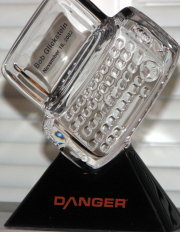
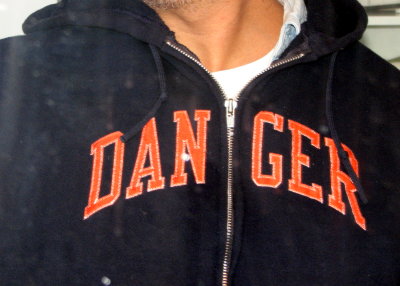

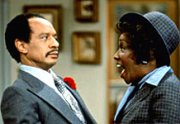 Chuck, apparently interpreting this to mean “race-appropriate,” indelicately suggested, “We do know the theme song from
Chuck, apparently interpreting this to mean “race-appropriate,” indelicately suggested, “We do know the theme song from  After the Chud cards were distributed, Steve announced that the winner would receive a prize. The prize was beef jerky. A few days earlier, Andrew and I had gone to a snack-food wholesaler to buy enough beef jerky for the whole audience.
After the Chud cards were distributed, Steve announced that the winner would receive a prize. The prize was beef jerky. A few days earlier, Andrew and I had gone to a snack-food wholesaler to buy enough beef jerky for the whole audience. A few days ago I read
A few days ago I read  my new friend Chuck had a computer at home, which was almost unheard of in those days. (His dad was a professional programmer and weekend computer hobbyist.)
my new friend Chuck had a computer at home, which was almost unheard of in those days. (His dad was a professional programmer and weekend computer hobbyist.) The resulting game, which we called ElectroMusiQuiz, required players to answer music-history questions on cards that could then be inserted into a slot that would cause the right answer to appear on a 7-segment LED. A right answer meant you could advance your gamepiece across the board. ElectroMusiQuiz was extremely crude, but on the day everyone brought in their board games, ours was the one everyone wanted to try!
The resulting game, which we called ElectroMusiQuiz, required players to answer music-history questions on cards that could then be inserted into a slot that would cause the right answer to appear on a 7-segment LED. A right answer meant you could advance your gamepiece across the board. ElectroMusiQuiz was extremely crude, but on the day everyone brought in their board games, ours was the one everyone wanted to try!  (This was before ubiquitous electronic goodies, you must understand, when
(This was before ubiquitous electronic goodies, you must understand, when 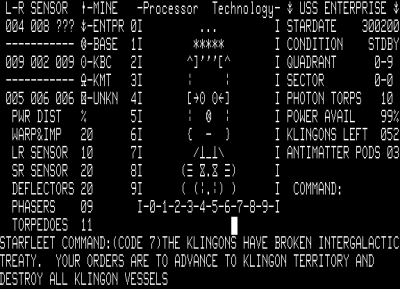
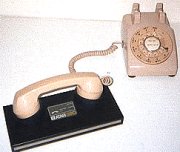 Occasionally we’d watch in awe as Chuck’s dad used a modem to connect his computer to the mainframe at his office. It was an acoustic modem, the kind Matthew Broderick uses in WarGames, where a telephone handset is jammed into a pair of rubber cups, one housing a mic for listening to the screechy data sounds from the handset, and one housing a speaker for making screechy data into the handset’s mic. Such a device was only possible, of course, at a time when telephone handsets were all a standard size and shape.
Occasionally we’d watch in awe as Chuck’s dad used a modem to connect his computer to the mainframe at his office. It was an acoustic modem, the kind Matthew Broderick uses in WarGames, where a telephone handset is jammed into a pair of rubber cups, one housing a mic for listening to the screechy data sounds from the handset, and one housing a speaker for making screechy data into the handset’s mic. Such a device was only possible, of course, at a time when telephone handsets were all a standard size and shape.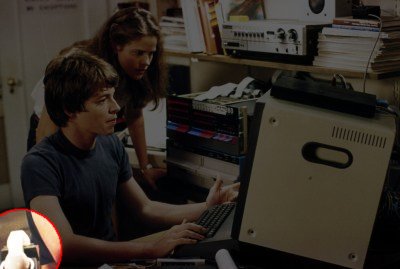
 Recently I came across this photo online of a young Orson Welles and immediately saw (a broodier, better-dressed version of) myself.
Recently I came across this photo online of a young Orson Welles and immediately saw (a broodier, better-dressed version of) myself.
 A few minutes later: Eeeeeeeeeeee! Jump up, hunt, smash, sit down. And then: Eeeeeeeeeeee! Jump up, hunt, smash, sit down. And again. And again. I started keeping count. I could no longer read. I was on heightened alert. Each time I sat back down I could only dart my eyes around the room, trying to spot the next mosquito, heart pounding, ears straining.
A few minutes later: Eeeeeeeeeeee! Jump up, hunt, smash, sit down. And then: Eeeeeeeeeeee! Jump up, hunt, smash, sit down. And again. And again. I started keeping count. I could no longer read. I was on heightened alert. Each time I sat back down I could only dart my eyes around the room, trying to spot the next mosquito, heart pounding, ears straining.